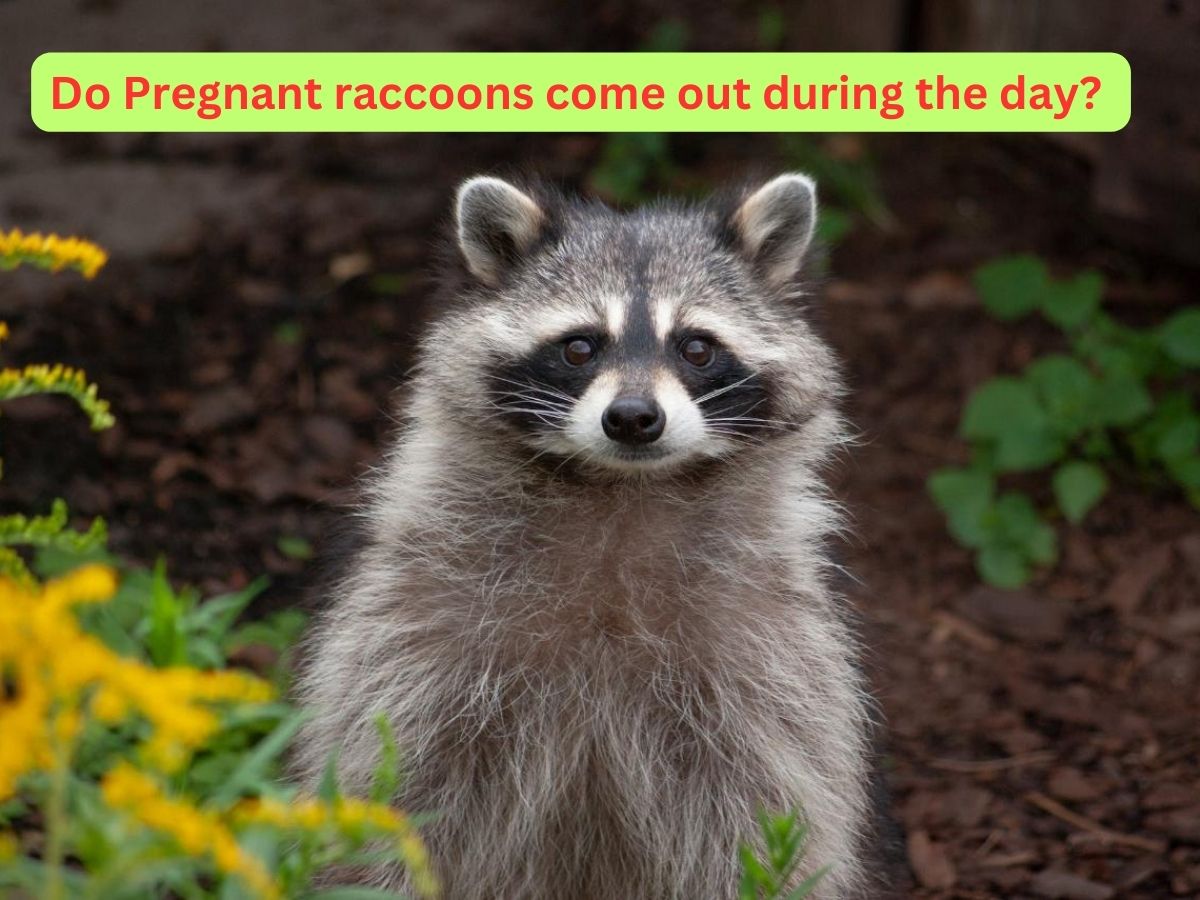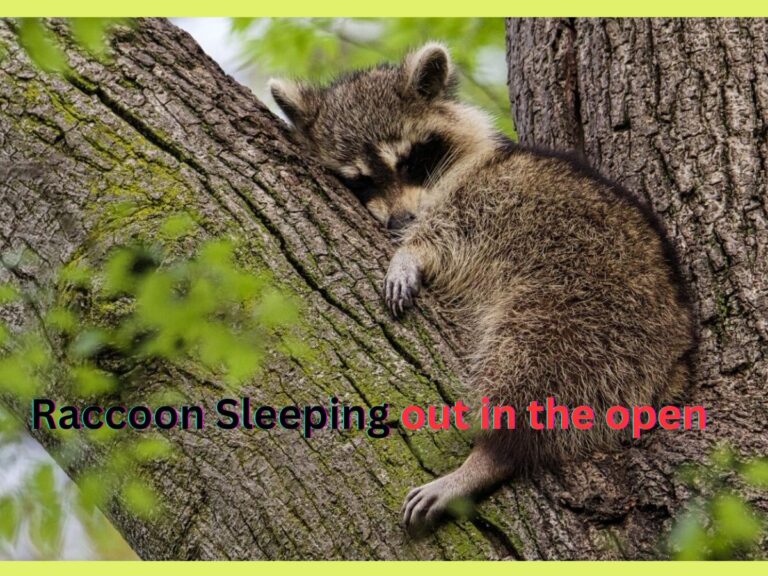Do Pregnant Raccoons Come Out During the Day?
Have you ever spotted a raccoon wandering about during the day and wondered, “Do pregnant raccoons come out during the day?” It’s a perplexing question that often leads us to think about the secretive lives of these curious creatures. If you have the same kind of query and want to know the exact answer, don’t worry, you have landed on the true web page.
Here you will find exact information about the habits of pregnant raccoons. Let’s delve into the fascinating world of raccoons, throwing light on the behavior of pregnant raccoons.
Raccoon- A brief intro:
Native to North America: Raccoons are animals that live in North America. They have grayish-brown fur, black patches around their eyes, and a bushy tail with rings. They have high IQ levels like monkeys. They know how to solve the problems. Consequently, they can open the doors and even sometimes the locks too.
Nocturnal Habits: These creatures are known for their nighttime habits, as they prefer to be active when the sun sets. During the day, they find refuge in their dens, where they rest and stay out of sight. But as the night approaches, they venture out from their shelter to embark on their nightly activities. They hunt their food or engage in other nocturnal activities.
Opportunistic omnivorous: Raccoons are omnivorous and eat many things like fruits, veggies, bugs, and even our leftovers from trashcans. They have great appetites, and they must eat to satisfy their hunger. They are opportunistic eaters and always prefer to eat easy food. They are intelligent and can open things with their hands.
Like to live Alone: Raccoons usually like to live alone but can sometimes be seen in small groups, especially during the spring mating season. Mothers are known for their strong maternal care. They take care of their babies in dens and stay with them until they are old enough to be on their own.
Very Adaptable: They are very adaptable and can live in both wild areas and urban settings. They are found in diverse environments like drylands, wetlands, forests, and even deserts. are good at adapting to different places, even in cities. Sometimes, they make a mess by going through our trash cans.
Do Pregnant Raccoons Come Out During the Day?
Now, let’s address the core question: Do pregnant raccoons come out during the day? Yes, they do!
Pregnant raccoons like non-pregnant raccoons are nocturnal. They usually become active during nighttime. But sometimes, especially in towns and cities, they might come out during the day to find food or explore. This behavior is not very different from non-pregnant raccoons. Raccoons are smart animals, and they can adapt to different situations. Thus, the pregnant raccoons venture out during the daytime in search of food or any other activities. This departure from their usual behavior is influenced by a few factors as described below:
1. Forage for food:
Firstly, pregnant raccoons come out during the day to search for food. Raccoons are opportunistic eaters, and expecting mothers have increased nutritional requirements to support their growing bodies and developing offspring. So, they might be more likely to forage for food during daylight hours when it’s available.
2. Search for water:
Additionally, raccoons require water to get hydration. Especially, pregnant raccoons need water to grow their developing embryos. Thus the pregnant raccoons come out from their nests for water intake during the daytime. Same as food intake, the required amount of water keeps them active and healthy. So, if the mother is healthy the growing kits are too.
3. Nest preparation:
Pregnant raccoons typically make nests to give birth and care for their offspring. They are very conscious of nest preparation. So, they come out from their nests during the daytime to make their nests. Here’s a detailed view of their nest-building process:
I. Gathering Materials:
When raccoons are pregnant, they work hard to gather different things to build their nests. These materials can be leaves, grass, twigs, and anything soft or warm they can find, like moss or shredded paper. Raccoons are good at using their clever paws to arrange these materials neatly.
II. Choosing a Nesting Spot:
Raccoons are quite flexible when it comes to picking a place for their nests. They like spots that keep them safe and protected, like tree hollows, empty burrows, or even places made by people, such as attics. Pregnant raccoons especially like private places, so they can have their babies and take care of them without too much noise or disturbance.
III. Making a Cozy Nest:
Female raccoons are really good at building a comfortable and warm nest. They know how to arrange the materials they’ve collected in layers, making a soft and snug place for their babies. The inside of the nest usually has even softer materials, making it perfect and cozy spot for newborn raccoon kits.
IV. Nesting Habits:
Pregnant raccoons start showing nesting behaviors just a few weeks before delivery. They work hard to get the nest just right, making sure it’s comfortable and safe. After the babies are born, the mother raccoons stay in the nest with them, taking care of and feeding them until the little ones are ready to go out and explore.
In summary, pregnant raccoons, while primarily active at night, may be active during the day due to various factors like foraging food, water, and gathering nesting materials.
How to tell if a raccoon is pregnant?
It can be difficult to tell if a raccoon is pregnant. However, here are some signs that may indicate a raccoon is pregnant:
- Behavioral Changes: Pregnant raccoons rest more to conserve energy for pregnancy and nursing. They can also become less active, especially later in pregnancy.
- Appetite: Some pregnant raccoons eat more to support their developing babies, while others might eat less due to discomfort.
- Weight Gain: Weight gain is a common pregnancy sign. If you can safely weigh a habituated raccoon, it can help confirm pregnancy. However, it’s not practical for wild raccoons.
- Visible Abdominal Changes: In the later stages of pregnancy, a raccoon’s belly might look slightly larger. However, it can be hard to see from a distance.
- Nesting: Pregnant raccoons come out from their nests during the daytime to get food, water, and nesting purposes for kits. They prepare a comfortable and well-protected nest for their upcoming kits.
Remember, if you’re uncertain, it’s safest to assume a raccoon is pregnant and avoid approaching. They can be aggressive when feeling threatened.
Conclusion:
So, the answer to “Do pregnant raccoons come out during the day” is “Yes”
Sometimes, pregnant raccoons come out during the day for a few basic reasons. They might be hungry and looking for food because they couldn’t find enough at night. They could also work on their nests, gather materials, or fix them up. Safety plays a part too; if they feel threatened by predators or people, they might stay out of sight during the day. Extreme weather can also make them change their usual routine. If you see a raccoon during the day and it seems sick or hurt.
If you see a raccoon in the daytime, it might be pregnant. They change their habits because being a mom and surviving in the wild can be tough for them. That’s just how they do things.
FAQs:
Raccoon pregnancies typically last for about 63 to 65 days, which is roughly two months. After this gestation period, the female raccoon gives birth to a litter of kits, which can vary in number but usually ranges from 2 to 5 offspring.
Raccoons typically have one litter of kits (baby raccoons) per year. They are not known for having multiple litters in a single year. The breeding season for raccoons typically occurs in late winter or early spring, and the female raccoon gives birth to her litter in the spring or early summer.
Yes, pregnant raccoons come out during day time in search of food and water. Additionally, they prepare their nests before the birth of kits.







